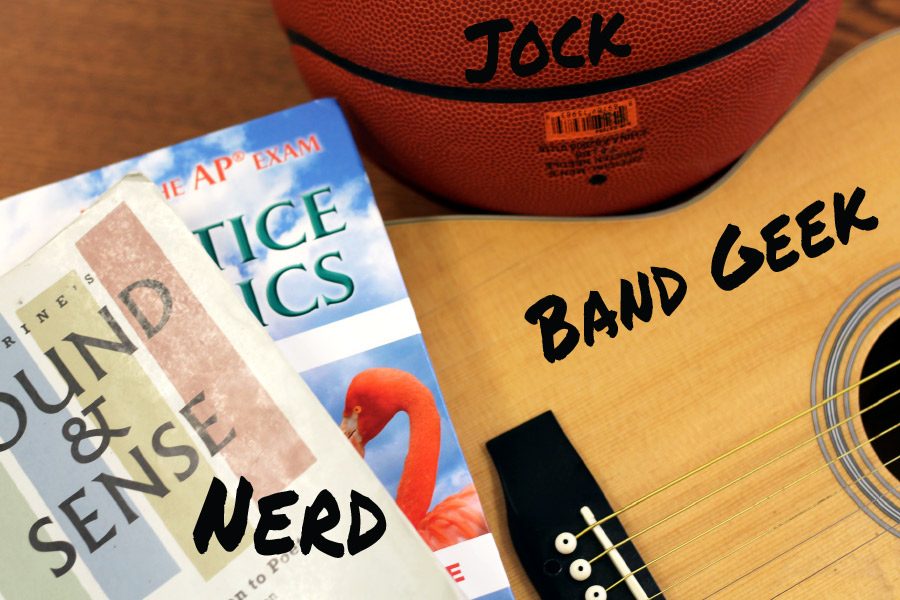Stereotypes divide community
Instead of listening to stereotypes and being ashamed of them, as a community we must support each other and not place each other and ourselves into these stereotypical categories. Whether a student is a dedicated athlete, student, musician, or actor, one description does not fit all, and we must stop labeling students into groups.
Throughout my years of high school, there is one thing that has become clear: everyone is different. Every student has a different hobby, different personality, and different beliefs, which is why I often ask myself the same question: why are stereotypes so present in our community?
You would think after countless civil rights leaders and newly implemented laws, we’d be able to appreciate diversity instead of having division. However, the community is split due to different hobbies and the stereotypes that come with them.
We often find ourselves listening to stereotypes involving our activities and interests, whether we discover them through media, personal experiences, or stories. The smart student is unpopular. The athlete isn’t intelligent. The theater and band kids aren’t athletic. When we start accepting these statements as reality, we start dividing ourselves accordingly. It is time we understand that these stereotypes are wrong. For example, some smart students shy away from socializing because they don’t want to be made fun of.
I recently spoke with a quiet, straight-A student about her daily activities. She seemed surprised by my question and carefully replied that she doesn’t do much besides study. After I urged her to tell me more, she explained her devotion to her faith and the countless hours she has spent helping children at her church. It was clear that she was insecure – she didn’t want me to judge her for these activities. “I don’t want to waste your time with school and church because it isn’t that big of a deal,” she said.
Instead of letting our classmates struggle with insecurities like these, we should be promoting their individuality. The smart student should be appreciated for hard work. To earn good grades, the student must focus while dedicating their time, and the student must be independent and strong-willed. These are the qualities we should celebrate.
Similarly, an athlete immediately makes me think of the term “jock,” which tends to carry a negative connotation. Throughout this year, cheating has been at an all-time high. When I asked a classmate why this was, she said, “It’s because of the athletes. They don’t have to worry about schoolwork because they get a free ride to college no matter what, so they take answers from everyone.”
Because of this, some athletes are uncomfortable with their inability to complete schoolwork as effectively, although it is mainly due to practice schedules and multiple games per week. Just because someone is a dedicated athlete, this should not label him or her as unintelligent. Instead, we should realize that these stereotypes are wrong.
Likewise, students involved in theater and band also find themselves divided by false stereotypes.
Recently, the Theatre Department produced “Shrek The Musical,” which was filled with talented actors and singers. However, during the show preview, I heard several negative comments.
“This is so gay” and “This is the stupidest thing I have ever seen” were reoccurring statements, not to mention the constant mocking of the performers, specifically the males, on stage.
It is because of negative feedback that students who participate in theater are insecure about their hobby. We should recognize these students as good public speakers, who can easily present in front of large crowds.
There are ways to solve stereotypes by proving that one description does not fit all. If students get involved in others’ interests, the separation of our community could be mended.
For example, the basketball team took part in the performance of “High School Musical” in fall 2015. They used their skills to dribble in the song “Get Your Head in the Game,” and their participation was something that brought more people to see the show. Something like this is a simple step in the right direction.
When we take part in other people’s interests like the basketball team did, we become one unit. By participating in the play or trying out for a sport, there is no separation – no “us and them.” There is now only “us.”
And with this in mind, we must understand that being a good student isn’t synonymous with being anti-social. Being an athlete isn’t synonymous with being unintelligent. Being a member of the Theatre Department isn’t synonymous with being unathletic. Students are diverse and this should be revered, not judged. It is up to the community to support students in what they do best.
Alyssa Kraus is a Copy Editor for The Patriot and jcpatriot.com.



